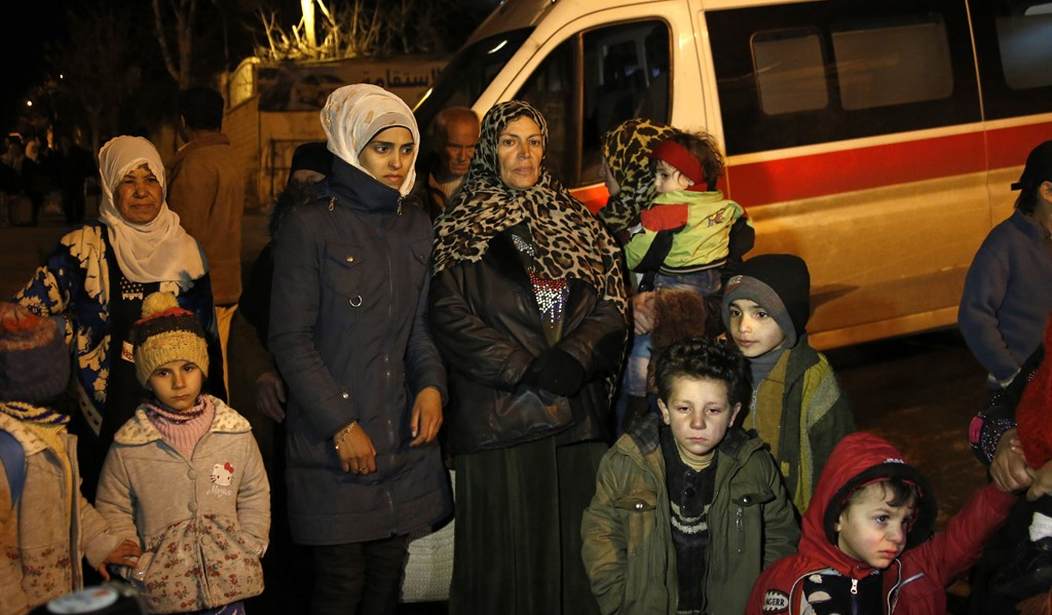It’s surprising how time slips away: Five years ago next month, President Obama proclaimed a “responsibility to act” when American “interests and values are at stake.”
He made that statement in a major address at the National Defense University in Washington, DC. Within days, a no-fly zone was established over Libya, and the forces of longtime dictator Muammar Kaddafi were stopped in their tracks.
In April, Mr. Obama, British Prime Minister David Cameron and then-French President Nicolas Sarkozy issued a joint letter congratulating themselves for having prevented a “bloodbath.” They emphasized: “Tens of thousands of lives have been protected.”
It appeared that Mr. Obama had established a principle – perhaps even a doctrine. “Sometimes, the course of history poses challenges that threaten our common humanity and our common security,” he said in his 2011 speech. “These may not be America's problems alone, but they are important to us. They're problems worth solving.”
An admiring article in Rolling Stone called Mr. Obama’s Libya policy “one of the clearest examples to date of his leadership style and his broader vision for international affairs.”
Or not. It also was in March 2011 that Syrians – most of them not Islamists -- began to peacefully demonstrate against longtime dictator Bashar al-Assad. Mr. Assad responded by shooting them. By May, there were tanks in Deraa, Homs and the suburbs of Damascus. Chemical weapons and “barrel bombs” would soon be used on civilians as well.
According to a report issued last week by the Syrian Center for Policy Research, the total number killed is now at least 470,000– almost twice as high as estimated by the United Nations a year and a half ago. Millions more have been displaced, left destitute and homeless. Hundreds of thousands have been streaming into Europe creating a crisis, the long-term impact of which has yet to be determined.
Recommended
Why didn’t Mr. Obama apply the “responsibility to act” to end the Assad regime’s threat to “our common humanity and our common security”? To be charitable, early on most Middle East experts believed Mr. Assad was fated to fall -- probably sooner, rather than later. A member of the Alawite minority, he had too few loyal troops to prevail against Syria’s angry Sunni majority.
What that failed to take into account was the support Mr. Assad would soon receive from Iran, from Hezbollah, the Islamic Republic’s Lebanon-based foreign legion, and from Vladimir Putin.
Meanwhile, in the wake of Mr. Obama’s precipitate withdrawal from Iraq, al Qaeda’s Mesopotamian branch rose from the ashes and expanded into Syria where it declared itself the Islamic State (also known as ISIS and ISIL) -- a new caliphate, successor to the great Islamic empires of old.
Perhaps Mr. Obama believed there was “no military solution.” Perhaps he feared that taking action would undermine his “reset” with Russia and jeopardize his negotiations with Iran. Perhaps he expected the Islamic State, which he initially dismissed as a “jayvee team,” would quickly burn out in the Levantine sun.
It’s a mystery. And here’s another: Among the senior advisors who made the most vehement case for intervention in Libya was Samantha Power, a journalist, scholar and diplomat who built her brilliant career on the issue of genocide. She literally wrote the book: “A Problem From Hell: America and the Age of Genocide.”
In 2012, Mr. Obama chose Ms. Power to chair a newly formed Atrocities Prevention Board which, I think it only fair to conclude, did not succeed in preventing many atrocities. The following year, the president made her the U.S. ambassador to the United Nations with cabinet-level rank.
A brief excerpt from her book: “People have explained U.S. failures to respond to specific genocides by claiming that the United States didn’t know what was happening, that it knew but didn’t care, or that regardless of what it knew, there was nothing useful to be done.
“I have found that in fact U.S. policymakers knew a great deal about the crimes being perpetrated. Some Americans cared and fought for action, making considerable personal and professional sacrifices. And the United States did have countless opportunities to mitigate and prevent slaughter. But time and again, decent men and women chose to look away. We have all been bystanders to genocide. The crucial question is why.”
One must wonder: Is Ambassador Power asking herself that question now that she’s a key figure in an administration that for five years has been choosing to look away from the carnage in Syria and hardly mentioning – much less taking steps to “mitigate and prevent” -- what history is likely to record as the genocide of Middle Easter Christians?
On the same day last week that the Syrian Center for Policy Research released its report on the death toll, American, Russian and other diplomats meeting in Munich agreed to a “cessation of hostilities” that is to begin within a week. Critics say it will allow Assad and his allies to consolidate their recent gains and prepare for further advances.
We should hope the critics are wrong. But by now we also should have learned that the Russians and Iranians do not see diplomacy as does Mr. Obama. They are not trying to “get to yes,” find “win-win” compromises or achieve “conflict resolution.” Sparing innocent lives is certainly not a priority. To them, diplomacy is war by other means, and wars are for winning.
As they see it, Americans in recent years have been defeated in one diplomatic battle after another -- by North Koreans, by Cubans, by Iran’s revolutionary jihadis. They expect to build on this trend. A convincing argument that they’re wrong would be challenging to mount.
























Join the conversation as a VIP Member